I live in a swank town. How swank, do you ask? Swank enough that there is no trash pickup at the curb. We wouldn’t have those barrels on our sidewalks. You take all of your trash and garbage to what we used to call “the dump” years ago, but is now the “Recycling Center”. It is so nice, in fact, that there is a large section where people leave off their used books, often in mint condition. After dropping off my trash on Saturday, I was looking some of them over, when a woman arrived with several bags full of books. She explained that she needed to clean house to make room for all of her daughter’s textbooks. Before the professional vultures were able to grab up all of the books in those bags, I picked out a copy of a book I had seen for years, but had never opened up, Al Frankens’ Lies and the Lying Liars Who Tell Them: A Fair and Balanced Look at the Right.
As you all probably know, there is quite a cottage industry out there for the chattering skull class of apologists from the extreme left and the extreme right who are making a fine living out of telling us how the other side is screwing up the country and leading western civilization into total destruction. On the right, there are books like Laura Ingraham’s Shut Up and Sing: How Elites from Hollywood, Politics, and the UN are Subverting America, as well as books by people like Ann Coulter, Bill O’Reilly, Michael Savage, and Sean Hannity. On the left there are books by Michael Moore, John Stewart, Bill Maher, and Al Franken.
Flipping through Franken’s book yesterday, I do have to admit that there was a lot to chuckle about. There was one chapter in particular, with a comic book spoof called “Supply Side Jesus”. Here Franken takes the religious right to task for hitching their wagon to country club “neo-con” economic libertarians. I thought the strip was quite funny and hard-hitting at the same time. Beliefnet has most of the cartoon panels here, with some interesting commentary from various readers thrown in. What do people think?
Monday, August 28, 2006
Friday, August 25, 2006
With the Trappists at St. Joseph’s Abbey

A co-worker told me yesterday that I looked less tired than I did before I went on vacation. It was the first time I’d had a chance to relax in a while. I got a little more sleep than usual (maybe because I was blogging less!) It put me in mind of the last time I’d had a chance to unwind…
As an anniversary gift back October of 2004, Anne booked me a weekend retreat with the Trappist monks at St. Joseph’s Abbey in Spencer, MA. I spent it with them the long weekend after Thanksgiving. She figured I needed a break and some time away from the stress of work and from our “active” household of children, etc..
How to plan a visit.
(BTW, these are the guys who make the Trappist jams and jellies.. the best you can find anywhere)
It was a wonderful weekend, alternately relaxing and invigorating. The monks were kind, humorful, and patient, putting up with laymen like us who had a real hard time learning how to be truly quiet. They come from all corners of the globe and all walks of life. We accompanied them in their daily office, from Vigils at 3:30 AM to Compline at 7:40 PM. There are about 40 monks in residence. The chant was wonderful, although like Tony Hendra in the book Father Joe, I was wishing the chant was in Latin rather than English. They did chant a Salve Regina in Latin on Saturday evening, with the stained-glass window of Mary in the nave lit up from outside. It was wonderful.
A monk’s routine:
3:10 am - Rise
3:30 am - Vigils, a communal praying of the Psalms
4:15 am - Personal prayer and sacred reading, a light breakfast and attention to personal needs
6:00 am - Lauds, morning prayer, followed by Eucharist and time for prayer and reading
8:00 am - Angelus; the Great Silence ends
9:00 am - Morning work until noon
10:00 am - Tierce, midmorning prayer, in the workplace
12:15 pm - Sext, midday prayer, followed by the communal meal
1:00 pm - Dishes, rest or a walk
2:00 pm - None, midafternoon prayer, followed by afternoon work
4:30 pm - Time for prayer, reading, exercise
5:40 pm - Vespers, evening prayer, followed by a light supper and time for prayer and reading
7:40 pm - Compline, night prayer, concluded with the chanting of the Salve Regina
8:00 pm - Retire; the Great Silence begins
We stayed in very spare but comfortable cells, where we could spend time in contemplation, prayer, and spiritual reading. The guest house also had a chapel with the Blessed Sacrament where you were allowed to visit at any hour, for any length of time.
There was a brief conference on Saturday morning, which presented the only awkward moments. The priest giving the conference may have been a tad too metaphysical for most of us in attendance. Most of the guys who attend these retreats are quite conservative, and the monks are somewhat beyond all liberal/conservative divides and issues. The spirituality of these guys is truly on another plane. When I went to him for confession, however, I found him empathic and quite wise in practicality for someone who had been cloistered for over 50 years.
We ate our meals in silence (well, almost.. they played an audiotape of Desmond Tutu reading his newest book while we ate). Afterwards, we were all responsible for cleaning up, washing the dishes, and setting the tables for the next meal. It is amazing how everyone learns to find their own niche in the work, even in total silence.
All in all, it was a deeply spiritual experience, and made we aware of my own personal need to concentrate more deeply on my prayer life and to take account of my own disposition and tendencies towards controversialism. The next time I go on retreat, however, I think I would like something more directed.
There was one other thing I found out about myself. Although I do need to have my time spent alone in solitude now and then, and although I do get a lot out of contemplative prayer, I wouldn’t have been cut out to be a monk. After a few days spent in there with all of those old gents, I couldn’t wait to see Anne again. ;-)
Thursday, August 24, 2006
The Book Meme

As noted previously, I was tagged for the book meme by Liam. Here’s my shot at it, slightly changed from what I had posted in a combox once at Crystal’s. My list is likely to be far more plebeian than Liam’s fine list, which was certainly more intellectual. :-)
1. One book that changed my life
The Mythmaker, by Hyam Maccoby. It rocked my world and my perception of what I thought I knew. If my faith hadn’t been so strong, it really might have shaken it, but as I’ve since read other more talented authors in a similar vein, it has actually turned out to be faith-affirming in the long run. Maccoby’s approach is now a little dated, and some of his conclusions well-refuted, but it opened me up to a new avenue of scholarship that I find fascinating.
2. One book that you’ve read more than once
All Quiet on the Western Front, by Erich Maria Remarque. A short but wide-ranging novel telling the story of World War I from a German perspective. Infantryman Paul Baumer tells the story of life in the trenches with his beloved comrades. None of them make it... I first read it in the Classics Illustrated comic book series when I was a kid, and it prompted me to read the book. It was the first serious, adult novel I had ever read. Remarque was a brilliant writer and storyteller, and the flow was riveting.
3. One Book you’d want on a desert island
The Bible. I think I’d really need it. Plus, it has everything in it that you could possibly want to read about. In addition to being the divinely inspired Word, it is fabulous literature.
4. One book that made you laugh
Without Feathers, by Woody Allen, and the shorter companion volume, Getting Even. It’s sad how art imitated life, and Allen’s life suffered a meltdown. I thought he was very funny at one time. I miss going to see his movies with a clear conscience.
A close runner-up would be The Best of Bad Hemingway competition, edited by George Plympton. I love Hemingway's short stories, and these parodies were hilarious.
5. One book that made you cry
I can’t thing of a book that has actually brought me to tears. Not the way some movies have, for instance. The closest was Johnny Got His Gun, by Dalton Trumbo. Another story of the First World War... The novel contains the thoughts of a wounded American soldier who gradually comes to the realization that he’s lost his arms, legs, sight, hearing, and ability to smell or speak. Eventually he learns to communicate with the outside world, but the outside world doesn’t want to hear him. They silence him.
Close runner-up: The Catcher In The Rye, by J. D. Salinger
6. One book you wish had been written
Java Made Easy for the Procedural Code Programmer. I’m an old COBOL programmer. Java and other object-oriented languages have been tough for me to master.
7. One Book that you wish had never been written
Hard to narrow it down, but there are a lot that come to mind… More than in some of the other categories.
It would be easy to say Mein Kampf, but I really don’t know how influential it was. I had to read it once, and it was so illogical, incoherent, and scatterbrained, it’s hard to imagine how even the staunchest Nazi could have made any sense of it.
Liam makes a great point about the Protocols of the Elders of Zion. This tract written by the Czarist secret police is still making the rounds.
Atlas Shrugged, The Fountainhead, or anything by Ayn Rand. I loathe Rand’s Objectivism, which was gussied-up selfishness given the veneer of a “philosophy”
Calvin’s Institutes, although I’m not looking for trouble with anyone. I’m not a big fan of Augustine to begin with, and it seems to me that Calvinism is like Augustinianism on steroids.
While I admire things that Tom Friedman has written about the Midlde East, I detest the globalization happy-talk he sells in books like The Lexus and the Olive Tree and The World is Flat.
8. One book you are currently reading
I have a list of three books I’m working my way through over on the right, above my links. One book that I recently finished was Mayflower. A Story of Community, Courage, and War, by Nathaniel Philbrick. The Mayflower story covered only about the first third of the book. The rest was about the fragile, intense, and complicated relationship between the English settlers and the Native Americans, which culminated in the calamitous King Philip’s War, which almost wiped the settlers out, and was devastating to the Indians of New England A fascinating read. I recommend it highly.
9. One book you’ve been meaning to read
There are quite a few important books that I’ve started in the past but have not quite been able to finish. Two of them that I need to get back to are A Peace to End All Peace. The Fall of the Ottoman Empire and the Creation of the Modern Middle East by David Fromkin. The other is Guns, Germs, and Steel by Jared diamond.
10. Now tag five people
You know what? I can’t tag five, I don’t have enough correspondents here to do it. I’ll name Paula, Steve, Don, and the Minor Friar.
Wednesday, August 23, 2006
Back From Ontario

Well, by the Grace of God, we have arrived safely back home from our trip to Ontario. Georgian Bay is a beautiful area. It reminded us very much of the coast of Maine, except with fresh water. A fun time was had by all.

The kids had a great time in particular, especially in being reunited with their Canadian friends. We had a wonderful time swimming, canoeing, kayaking (something I've always wanted to do. I loved it, although I looked a little comical trying to get out of it), tubing, cooking hot dogs and marshmallows over open fires, exploring our host's private island, and exploring "crown" (public) islands.
A few thoughts..
We stopped at Niagara Falls on the Way. If you ever get a chance to visit the Falls, do take a ride on the Maid of the Mist. The Falls are a wonder to behold, and the boat-ride is the best way to see them.
My advice on driving through Toronto: Don't, if you can possibly help it. It's white-knuckle driving most of the way, about the worst I've ever seen, and that includes NYC, the Garden State Parkway, Boston's Southeast Expressway, and the Capital Beltway.
Our hosts got a big kick out of me falling out of the canoe on my first attempt at climbing in. They claimed they had never seen anyone do that before. The truth is, I'm about 15-20 pounds over my fighting weight around the middle these days. I really feel like I can't do things quite like I used to. Then again, maybe I'm just getting old. Embarassing moment number 1.
The cry of a loon on a lake in the middle of the night is one of the most beautiful sounds there is.
There are rattlesnakes indigenous to that part of Canada. Who knew?
Embarassing moment number 2... At the end of our stay, our hosts had dropped us off by motorboat at the marina. We had driven about halfway through the Ojibway Reservation at Parry Sound before we realized that Anne's purse was missing. It turned out that we had left it back at the cottage on the island. We had to ask our hosts to make the trip all the way back to the marina again with the purse. Good provocation for a donnybrook of a fight between Anne and I. It was probably the closest to divorce we've ever come. :-)
Embarassing moment number 3... On the way home, we stopped in Syracuse to visit some friends and to have a meal. We said our goodbyes and started driving away, only to have our 10-year old daughter Tess come rushing out of the house shouting at us not to leave without her. It's a good thing Anne and I each have a self-deprecating sense of humor. We need it.

With the kids at Niagara Falls
I'm getting around to catching up with you all. I see that Liam has tagged me for the book meme. I'll have to get busy with that.
Cheers,
Jeff
Wednesday, August 16, 2006
On Vacation For A Week

This is a note to say that I’ll be heading out on vacation for a week, just in case I haven’t completely alienated all of my online friends and readers. :-) Will anyone notice if I’m gone? :-)

I’ve rented a huge van and the whole family will be going up to visit some friends from Toronto on an island off of Parry Sound, on Lake Huron. The amenities will be very basic. It’ll be interesting to see how we and our hosts will bear it under the strain of the eight of us visitors.
The Georgia Bay area of Lake Huron was the site of several Jesuit missions among the Huron Indians during the 17th century... Many of the “Black Robes” were martyred in this effort.
Martyrs Shrine
Brief Sketches of the Jesuit Martyr-Saints
John de
Brébeuf - the first Jesuit Missionary in Huronia (1626);
Gabriel
Lalemant - a Jesuit assistant to Brebeuf, he died March 17, 1649 at
Ste. Ignace;
Anthony
Daniel - a missionary near Bias-d'or Lakes (1632), founded the first
boys' College in North America (Quebec 1635);
Charles
Garnier- was a Jesuit Missionary in Huronia,
Noél
Chabanel - a Jesuit priest, suffered martyrdom, in 1649, on the
Nottawasaga
Isaac
Jogues - came to Huronia in 1636, helped to build Ste. Marie (1639),
René
Goupil - studied medicine and offered his services to the Jesuit missions in Canada
John de
Lalande - accompanied Jogues to the Mohawk Mission (1646), a martyr,
at Auriesville, N.Y.
Parry Sound is also the birthplace of the greatest hockey player of all time, Bobby Orr. I know that some are partial to Wayne Gretzky or Mario Lemieux, or certain others such as Bobby Hull or Gordie Howe… Having seen them all play, I’d have to say that for my money, Orr was far and way the best. Hands down.
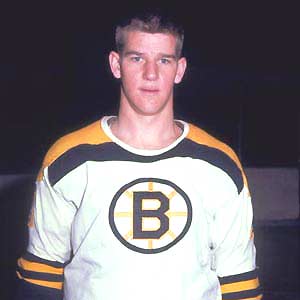
Sunday, August 13, 2006
Wearing Our Faith Well in the Light of the Spirit
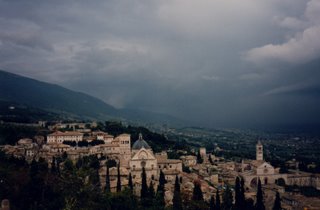
A thunderstorm approaching the city of Assisi
 Walking the spiritual path in a balanced way can be a challenge. A healthy path seems narrow and hard to navigate. I posted here some notes from a book by Fr. Ron Rolheiser not too long ago. The book deals with stories of balance and imbalance in the spiritual life. I try to keep two of his quotes in the front of my mind (the second one may actually be from Fr. Gustavo Gutierrez):
Walking the spiritual path in a balanced way can be a challenge. A healthy path seems narrow and hard to navigate. I posted here some notes from a book by Fr. Ron Rolheiser not too long ago. The book deals with stories of balance and imbalance in the spiritual life. I try to keep two of his quotes in the front of my mind (the second one may actually be from Fr. Gustavo Gutierrez):”The wrong God of the left and right is the God who is wired, bitter, anxious, workaholic, and unhappy.”
“Only one kind of person transforms the world spiritually – Someone with a grateful heart.”
In the second reading today we heard:
And do not grieve the holy Spirit of God, with which you were sealed for the day of redemption. All bitterness, fury, anger, shouting, and reviling must be removed from you, along with all malice. (And) be kind to one another, compassionate, forgiving one another as God has forgiven you in Christ.
Ephesians 4:30-32
I’m quick tempered and passionate. There are a lot of things going on in the world that seem unjust to me; that anger me. I’m tempted at times to vent here, and to pour some frustrations out, but I try to hold myself in check. Anger is an easy sell. There’s a ready market out there for it, but there is too much of it out there already. Selling anger is not what I want to do. I’m asking you guys to keep me honest on it. If you see me doing it, I’m asking you to call me on it and to bring me up short.
Still, on the other hand, we must speak up about injustice. We are called to be prophetic in our witness. Sometimes that calls for hard words, wit, and even some sarcasm. You see this in all of the prophets. How do we do this in a balanced fashion? How do we thread the needle?
Back in the 1980’s in the midst of my bachelor days, I started to get more serious about my faith. I became much more active in parish life. Over time I became great friends with the priests, and at their urging, volunteered my time to help out with the High School Youth Ministry Program. These were some great days. I enjoyed it thoroughly, and I got some great feedback from the priests, the students, and the parents. I was feeling pretty good about what we were accomplishing and feeling pretty good about myself.
At about the same time, there was an attractive young woman I was friends with at work. I suppose I probably had kind of a crush on her, although I felt like she was a little bit out of my league. You know the way people sort of flirt when they feel safe to flirt, because they both know it isn’t going to go anywhere? We got along well, and had lunch together almost every Friday.
One day, in front of a bunch of our co-workers, she hit me hard with a very cutting remark, and I was taken aback. I had absolutely no idea what I had done to provoke it. Had I said something inappropriate? Had I stepped over some sort of line? I couldn’t figure it out. In a pique, my response was to stop speaking to her altogether. This became very awkward, because the tension between us was obvious and unusual. Everyone else was starting to notice. We both realized we need to sit down and talk this matter through.
It turned out to be something that took me totally by surprise. It was over an incident I barely remembered or took any notice of. Once, during a group luncheon at the office, I had put out one of those money collection boxes for Oxfam, or Catholic Charities, or some such group. A lot of the food at the luncheon was left uneaten, and I made one of those classic snotty remarks about the waste and the starvation in other parts of the world, and how appreciated that food would have been elsewhere, etc.. etc.. Almost a throwaway of a line. A cliché. Apparently, this is what set my friend off. My sanctimoniousness. My self-righteousness. Who the hell did I think I was, anyway? I was treating them like a bunch of Middle School kids.
Most Catholics are familiar with the convert and singer/songwriter John Michael Talbot. I’m actually not much of a fan of his music. I prefer him as a spiritual writer. In his wonderful little book The Lessons of St. Francis, he writes this about his personal journey
In 1968, a period of social turmoil and heightened spiritual searching was under way. I was a fifteen-year old country rock star, traveling across America with my brother Terry in our band, Mason Proffit, which performed at packed concerts with artists like the Grateful Dead, Jefferson Airplane, and Janis Joplin. In six popular albums, our band preached a message of idealism and social concern centered around a few key issues, such as pacifism, racial tolerance, and environmentalism.
I was thrilled to be a part of a burgeoning youth movement that demanded answers to hard questions and sought to reinvent society from the bottom up. But certain inconsistencies in the movement startled and troubled me. Protesters arguing for peace were not opposed to using violence if it suited their needs. People searching for mystical revelation experimented with mind-transforming drugs, but then became so clouded and myopic that they lost all passion for spiritual pursuits, or any concerns beyond their own chemically souped-up egos.
My own hunger for spiritual answers became ravenous. Convinced that Christianity was part of the problem rather than part of the solution, I dug deeply into other spiritual paths, studying Buddhism, Hinduism, and especially Native American religions. Then the tables were turned on me as the truth I was so desperately searching for sought me out.
I was alone in a room in a Holiday Inn during the band's 1971 tour. I'm not sure what city I was in, but I vividly remember what happened there. My room filled with a brilliant light, and in the midst of the light was Jesus, dressed in white robes and with his arms stretched out toward me in a gesture of both gentleness and at strength.
At the time, America was experiencing a religious revival called the Jesus movement, as millions of longhaired ex-hippies came to Christ. I began studying with some of these exuberant new converts and, before I knew it, I became a fuming fundamentalist, a walking, talking Jesus freak who would quote the Bible or dispense judgment at the drop of a hat. If you had a problem, I had a Bible verse for you. I was angry, I was arrogant, and I was horrible to be around, all in the name of Jesus.
I knew something was wrong and wrestled with soul-searching questions. Hadn't I done everything my Christian friends had asked me to do? Hadn't I become everything they had told me to become? But I knew the Christianity I was living out and the Christianity I saw around me were nothing like what I read about in the Gospels.
Then an evangelical friend gave me a copy of a book about Francis by Franciscan priest Murray Bodo. I read the book and I wept. I realized how far from genuine Christianity I had fallen, even though the desire of my heart was to follow Christ. As I read, I realized that Francis had done it: He had lived a balanced and beautiful Christian life.
As I continued reading about this amazing saint, I realized he was the genuine article. He had lived a life of poverty when all I was seeing were typical, upper middle-class American Christians trying to balance their love for God with their love for money. He lived a life of mystical connection to God when all I saw was a cold and rationalistic form of Christianity that was all head and no heart. He lived a life of gentleness when all I saw was an arrogant, aggressive, my-way-or-the-highway Christianity. He lived a life of joy and radical commitment, when all I saw was an antiseptic, pedantic, down-the-middle-of-the-road meat-and-potatoes kind of Christianity that killed the spirit and squashed the joy.
In 1978, after a painful divorce, I began a sincere effort to follow in the footsteps of Francis, retreating to a hand-built hermitage in the Indiana woods where I focused all of my being on knowing and following the will of God. In 1983, I helped found an exciting, new Franciscan community in the Ozark Mountains. Today, I and millions of others remain committed to the ideal that Francis's life is a pattern for our lives.
When someone asks me what it is about Francis that attracts me, I want to respond by painting a picture. There's a distinct look and feel to Francis. His life conjures up images of the tattered hem of Jesus' garment on a dusty Galilean road. His rugged and radical life feels like the rough wood of a cross. His life smells like the earth of a medieval Italian roadway, or the fragrance of a forest full of beautiful pines, tall poplars, rugged olive trees, and fruit-laden grapevines.
At a time when millions of people are hungering for spirituality but are turned off by many traditional Churches, the life of Francis demonstrates that there is something to fill the God-shaped vacuum in our lives. That there is an answer to our soul's every longing. That the dream of inner and outer peace isn't an illusion. And that the potential person that God created us to be needn't remain lost and unrealized.
I also believe this: Even though some religious institutions may often look more like secular corporations than godly communities, Francis shows us that there's always room in churches for people guided by a radical spiritual commitment.
In this article, he also speaks well of another issue that is important to me and near to my heart:
Factions Within the Church
Don, on Nonviolence
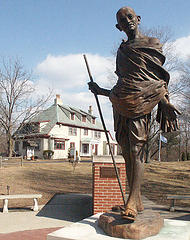 A statue of Mahatma Gandhi at the Peace Abbey, Sherborn, Massachusetts
A statue of Mahatma Gandhi at the Peace Abbey, Sherborn, MassachusettsThe subject of nonviolence is one that I've addressed here a couple of times before. I've wrestled and grappled with the whole idea, turning over the various moral dilemmas and practicalities in my mind in light of what I read in the clear words of Christ in the Gospels. Perhaps that is my whole problem... Look at the terms I use... Wrestling. Grappling.
Don, over at Reflections Of A Secular Franciscan, is a guy who seems to "get" nonviolence. Don can correct me if I'm wrong, but I believe he served in the U.S. Navy.
I urge everyone to read two superb posts he put up recently on the subject of nonviolence:
Romans 12
The Other
Thirteen!
Friday, August 11, 2006
Of Planes, Plots, and 9/11 films
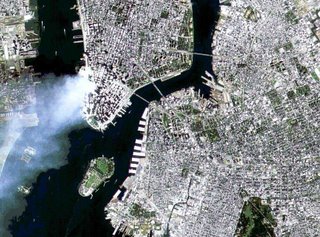 Planes again?
Planes again? I give a hat tip to Britain’s MI5 for tracking this plot. Those guys are pretty good at what they do. As for Pakistan’s ISI, the cooperate with one hand and foment with the other…
As we approach to the fifth anniverary of 09/11/01, it’s noteworthy that Oliver Stone’s new movie World Trade Center opened up this week. I haven’t seen it, and I don’t know if I even want to. For one thing, I’m not a big fan of Stone’s films. It has gotten mixed reviews, plus I really don’t know if I want to sit through the experience anyway. The whole genre of 9/11 films is somewhat questionable to begin with. Rather than seeing 9/11 as a one-off tragedy, it should be seen as something that has a high likelihood of being repeated in some fashion, as this week’s events show.
A few months ago I did see director Paul Greengrass’ film United 93 as soon as it opened. It thought it was was a pretty good movie. I appreciated how Greengrass was careful to avoid undue sentimentality and sensationalism.
The film opens up in darkness, and all you can hear is a voice speaking softly in arabic. As the light comes up, you see one of the hijackers reading from his Koran in his hotel room just before departing. I have to say, even somehat shamefully, that the arabic was annoying to me. It bothered me… got under my skin… especially to see it put in the service of violence through prayer. Greengrass did, however, try to portray the hijackers with some complexity, and not as typical Hollywood villains. Near the end of the film there is a sort of reprise of the prayer scene, when the control of the plane is being battled over between passengers and hijackers. The passengers in back are praying the Lord’s Prayer in english and the hijackers are praying in arabic…
United 93 uses unknown actors, which was another good idea from Greengrass. Some of the “actors” who were playing the part of air traffic controllers, supervisors and military personnel, were actual participants in the events of that day, playing themselves. The only problem with that was, they tended to be very strong personalities, and their performances overpowered those of the actors who were playing the characters on the plane. The plane scenes were a bit awkward. It’s hard to know what really happened on that plane. It is all speculation. Overall, it was pretty well directed, but I found that for most of it, my mind was wandering back to my own recollections of the events of that day. I’m sure that for most people watching, it was the same reaction.
One of the things I remember most about that spectacular September morning was how beautiful it was. As it sticks in my memory, I have to recall that it may have been one of the most perfect weather days I’d ever seen. A woman who worked on my floor, whom I didn’t know very well, was on the United 175 plane out of Boston that hit the south tower. There is another man on my floor who was supposed to go with her to an IT conference in Los Angeles. He decided at the last minute not to go. He still has the ticket manifest. He even had considered taking a couple of kids out of the first week of school for a few days to go to LA with him. Can you imagine?
It was a very strange day where I worked. My deparment was getting over the effects of data problems caused by the recent merger of the systems of two companies. We were still working in sort of a crisis mode. Despite all of the events going on around the country, and the loss of the woman I mentioned, everyone kept working. We all checked the news websites of course, but we kept on going…Strange. Maybe it was nervous energy. Maybe it was shame and fear and revulsion that a plane had been hijacked out of our own city. We all had the grim realization, of course, that a terrible war would result from the events, but in a lot of ways it would have been hard to see where we are today.
Thursday, August 10, 2006
Do we need a Fulton J. Sheen for today?
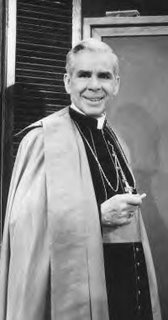 The post I made below on Billy Graham put me in mind of one of the men Graham professed admiration for and considered a friend - Archbishop Fulton J. Sheen.
The post I made below on Billy Graham put me in mind of one of the men Graham professed admiration for and considered a friend - Archbishop Fulton J. Sheen.Graham called Sheen’s death in 1979, "a great loss to the nation and both the Catholic and Protestant churches. He broke down the walls of prejudice between Catholics and Protestants . . . I mourn his death and look forward to our reunion in heaven." As Sheen would have put it himself, “If we can’t pray to God together in the pews, at least we can pray together on our knees.” Graham has taken much criticism from some Protestant fundamentalist circles for this stance. Graham himself is on record as saying “I have never received a piece of hate mail from a Roman Catholic.”
A number of years ago I was helping a friend clean out an attic. In doing so I came across an old edition of the Boston Globe from around 1953 or so. I just love finding time-capsule artifacts like these. In short time I had stopped lifting boxes and had sat down to start reading. I flipped through the paper, browsing the top stories, and getting a kick out of seeing what movies were playing at the time and in which theaters, many of which I knew no longer existed. One article in particular that caught my eye was one about how Bishop Fulton Sheen had spoken in front of a packed house of nearly 16,000 people at the Boston Garden… I wondered to myself, who within the Catholic Church could pull 16,000 people into a stadium to hear him or her speak today? There are many evangelicals who could do it, but within the Catholic Church I can think of no one besides the Pope who could pull in such numbers. Do we need a Fulton J. Sheen for today? We need someone like him. I wonder how Sheen himself and his style would go over today?
Bishop Sheen was one of the most important Catholic churchmen of the twentieth century. Doctor and teacher of philosophy, National Director for the Society For the Propagation of the Faith, author of over 90 books, anti-communist cold-warrior, auxiliary bishop for the archdiocese of New York, maker of high-profile Catholic converts, friend of Hollywood actors and actresses, host of the Catholic Hour radio program in the 1930’s, Bishop of Rochester, and sometimes bitter rival to Cardinal Spellman of New York, Sheen is probably remembered best for being a television pioneer with his Life Is Worth Living program in the 1950’s. Anyone who’s tuned into EWTN on a Friday night has probably caught some of the re-runs of this program, where Bishop Sheen (with his angel assistant) does a “chalk talk” up at the blackboard in a simple studio format for about a half an hour. I must say, that when I do catch one of these, I’m usually hooked to stay in for the whole program. With his piercing blue-eyed gaze, strong stage-voice delivery, charisma, sense of drama, rock-solid faith, and Irish wit and humor, his style went over very well in it’s time. I’m not so sure it would go over quite as well today.. It might seem a bit hokey today, and Bishop Sheen was the first to admit that his greatest weakness was vanity, but I think the programs hold up remarkably well over the years regardless.
Sheen had a certain way of phrasing things in couplets so that they had a certain punch and stuck in the memory, such as "If you don't behave as you believe, you will end by believing as you behave."
The manger and the Cross stand at two extemities of the Savior’s life! He accepted the manger because there was no room at the inn; He accepted the Cross because men said, “We will not have this Man for our king.” Disowned upon entering, rejected upon leaving. He was laid in a stranger’s stable at the beginning, and a stranger’s grave at the end. An ox and an ass surrounded His crib at Bethlehem; two thieves were to flank His Cross on Calvary. He was wrapped in swaddling bands in His birthplace, He was again laid in swaddling clothes in His tomb - clothes symbolic of the limitations imposed on His Divinity when He took on a human form…. He was already bearing His Cross - the only cross a babe could bear, a cross of poverty, exile and limitation. His sacrificial intent already shone forth in the message the angels sang to the hills of Bethlehem: Today in the city of David a deliverer has been born to you-the Messiah, the Lord.
On a lighter note (not to mean any disrespect), I’d have to say that one thing my post-Vat II sensibilities finds a little jarring is the cape that he wore. We’re just not used to seeing it on bishops nowadays. I can just imagine how millions of Protestants must have reacted to it too. There must have been a little bit of a “Count Dracula” effect… I find myself wondering if there were some anti-Catholic wags who felt tempted to draw mischievous comparisons between Sheen and the 1950’s R & B artist Screamin’ Jay Hawkins.
A book by Bishop Sheen that I would highly recommend – Life of Christ
Cause for his Canonization
Wednesday, August 09, 2006
A Class Act
 Billy Graham in his twilight years... There’s an interesting cover article about him in Newsweek magazine. I admire Billy Graham. As he’s grown older, I believe he’s grown in wisdom and humility.
Billy Graham in his twilight years... There’s an interesting cover article about him in Newsweek magazine. I admire Billy Graham. As he’s grown older, I believe he’s grown in wisdom and humility.
Monday, August 07, 2006
My Spanish is a little bit rusty...

Joe (the good-looking guy on the left), Jeff (posing),
and a diminutive Spanish gentleman of great dignity.
Puerta Del Sol, Madrid. November, 1991
As a result of some Google searches, I've come to the embarrassing realization that I had misnamed my blog when I created it.
A few people have asked me why I've titled my blog Aun Estamos Vivo. It is supposed to mean We Are Still Alive, as in those of us Catholics who have not yet given up on the Second Vatican Council.
Like I said, it has come to my attention (I think) that the correct way to say this is Aun Estamos Vivos, with "vivo" pluralized. Duh. My High School Spanish teacher would have been horrified... and to think that I was proud of myself for not calling it Ya Estamos Vivo... Yeeesh... At any rate, anyone who has been generous enough to link me can leave it the way it is. I still haven't decided if I liked it better with my mistake or not. The mistaken way sounds better to me somehow.
My wife Anne doesn't really like the fact that I blog. I suspect that this is typical for bloggers with spouses. No woman likes to talk to the back of man's head while he's looking at a computer screen. Anyone have any advice on that?
Anyway, one of the things that she teases me about is the title. "Why did you give it a Spanish title?" she asked. "People will think you're in Opus Dei." I replied, "No, I really don't think that they will."
Monday, July 31, 2006
In Vino Veritas?

I’ve always liked Mel Gibson and enjoyed his films, but starting back around the time of Braveheart or so, it seemed as if a dark streak evocative of personal turmoil within his own personality seemed to become more and more visible as a feature in his films.
The movie The Passion of the Christ was a film that I had awaited with great anticipation. The Stations of the Cross are my favorite Lenten Devotion. For me, one of the highlights of the liturgical year is the reading of the Passion narratives. Not only did I want to see it for my own faith and edification, but I felt that Gibson was being unfairly smeared and attacked by tin-eared critics and left-wing theologians who hadn’t even seen the film yet. I was resentful of the attacks being made on Gibson and the film by critics such as Frank Rich, Paula Fredriksen, Abe Foxman and the ADL, and Eugene Fisher.
I saw the film with one of my closest friends and his wife one night shortly after it opened. While there was much in the movie that I thought was well done and impressive, there were also some overtones in it that I found disturbing, especially in its obsessive focus on blood and on the demonic… Particularly with demonic visions with no supporting references in the scriptures. It was hard for the three of us to speak after the numbing experience of seeing the film. The silence over dinner was a bit awkward and embarrassing. I think that the film was not quite what each of us had expected. At least, speaking for myself, I’d say that his “vision” of the events of the passion story didn’t square up too well with mine.
As I wrote on the Friar’s blog, regarding my take on the film:
As for The Passion, I thought it was a fair-to-good movie that could have been a great movie, but missed the mark. I wouldn't go as far as to say that it was anti-semitic, but it went right up to the very edge. It darned near was. I thought the Jesus and Mary characters were wonderfully done, but I thought the brutality was over the top (and the Stations of the Cross happens to be my favorite devotion). Gibson seems to have a blood and brutality fetish that says more about him and his own demons than it does about Christ. It was a movie that I really wanted to like, but it left me quiet and very unsettled and troubled...
As everyone probably knows, Gibson was recently arrested for DUI in Malibu. The arresting officers reported that he had gone off on an anti-semitic rant, a rant that he has not denied and that he has apologized for profusely.
A Los Angeles Sheriff's Department report states that when Gibson was arrested early Friday morning for speeding with a .12 blood alcohol level, the 50-year-old actor lashed out at "f--ing Jews" and said that "the Jews are responsible for all the wars in the world." Gibson had asked a sheriff's deputy, "Are you a Jew?"
After the story broke on Saturday, Gibson issued a statement apologizing for his behavior and for having "said things that I do not believe to be true and which are despicable," but none of those sentiments seem all that detached from the views of the actor's father.
A couple of points… It’s a good thing that he has apologized, and those who claim to apologize in sincerity should be given the opportunity to be heard out. Experience has shown me however, that being under the influence of alcohol does not so much induce anyone to say things that they don’t believe as much as it induces them to say things that they hold, but would not come right out and say otherwise. The other point is that although it is unfair to visit the sins of the father upon the son, Gibson’s father and his views do seem to have a powerful hold over Mel, and the son does seem reluctant to judge the sins of the father…
Hutton Gibson, 87, is a leading proponent of what is called Catholic traditionalism, a canon that rejects the changes to Catholicism made during the Second Vatican Council of 1962-1965, which the elder Gibson once called ''a Masonic plot backed by the Jews.''
Hutton Gibson is also outspoken in his views that the Holocaust never happened, or at least not to the degree that historians maintain...
In one radio interview in 2004, Hutton Gibson said that "most of " what historians say about the Holocaust is "fiction." He claimed that 6 million Jews weren't killed during World War II. Rather, he said, they moved…
He said concentration camps were merely "work camps." Holocaust museums, he said, are "just a gimmick to collect money."
For Jews, he said, "it's all about control. They're after one world religion and one world government. That's why they've attacked the Catholic Church so strongly, to ultimately take control over it by their doctrine." He added that "to a Jew a Christian commits idolatry every time he looks at a crucifix and says a prayer. You know they're in control and they're going to get in control the way things are going. Because they get all of our people."
His son, he said, was happy about the controversy over "The Passion of the Christ." "Mel says he absolutely couldn't buy PR like this," Hutton Gibson said. He thanked the Anti Defamation League for ensuring that "everybody knows the line now: 'Let the blood be upon us and our children.'"
Whether Mel holds these views or not, who knows... I am no angel myself. I’m not here to attack Mel Gibson personally. See the price I paid for my own stupid and careless anti-semitic comments in the lengthy post below. What I am sick and tired of, however, is to see remarks like those of Hutton Gibson appearing with greater frequency on the web by a subset of self-described Catholic “traditionalists” who try to pass this garbage off as orthodoxy. This stuff makes me ill and it is a disgrace to our faith when someone tries to pass it off as Catholic “Truth”. I hate seeing petty bigotry masquerading as faith.
As for Gibson, I pray for him. Why he suffers so, I cannot know. It seems that he has a good wife and children, and has had nothing but success in his career. Who can say what causes us to suffer? I hope he can conquer whatever it is that torments him.
Paula Fredriksen had a long running battle going on with Mel Gibson over the Passion film. Sure to evoke strong emotions on either side, is her article on the film entitled The Pain Principle.
I think she was wounded in the fray too. The concluding paragraph, which explains much of her public silence over the last few years:
Finally, Gibson and his minions, I must note with gratitude, have certainly educated me. The hateful emails that I and my colleagues have received, the websites that this movie has spawned, and the angry displays of muscular piety prompted by this phase in the American culture wars have left me humbled and remorseful. With what conviction can I remain amazed by the literalism, the anger, and the defining power of hate in Islamic fundamentalism? With much less excuse, we have plenty of our own home-grown varieties right here.
Saturday, July 29, 2006
Born in 1959. Memories from a Catholic Childhood
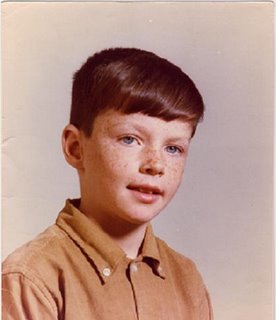
Jeff, AKA "Freckle-Faced Strawberry", circa 1967
Sorry I’ve been away so long. I’ve been pretty busy, plus I’ve been working on this rather lengthy post.
Several authors and other writers have written on this theme far better than I ever could, but I’ll take a shot at putting down some memories as well, because I was born during an interesting period of time.
I’ve noticed that some bloggers are a little older than me. The vast majority are much younger. A lot are converts. I think I might have some interesting perspective to add with my recollections, merely because of the niche that I fell into due to the year in which I was born. I've not only lived in the same community since 1962, but the same house and the same parish. My childhood coincided with the events of the Second Vatican Council. Therefore, my catechesis was a mixture of pre-conciliar and post-conciliar teaching, although I’d have to say that most of it was actually pre-conciliar. No one really knew how to implement that Council. The ship didn’t turn around overnight. There’s no way that a 2000-year-old institution can. Things just coasted along for a while as they always had. Some people wanted things to change. Some people wanted nothing to change. Some people wanted to change, but didn’t know how. Some people didn’t care or notice that anything had changed at all. Eventually things did change, but hardly in the ways that anyone had expected. My entire Catholic life has been the experience of Vatican II, in which I am still a firm believer and supporter.
The 1960s were a fascinating and exciting time to be a kid. Not only were there changes in the Church, but there were enormous changes in the culture all around. The Beatles and Rock music, the Civil Rights movement, the space program and the race to the moon, hippies, flower power, psychedelia, and of course, the shadow of Viet Nam hung over everything. The excitement of the 1960s turned into the disillusionment and vapidity of the 1970s. Viet Nam and Watergate weakened trust and respect for authority and institutions in all aspects of life. The Civil Rights movement seemed to lose its moorings after Dr. King was assassinated. Drugs seemed to have taken all of the promise out of the progressive youth movement, and progress in women’s rights had stalled and run into an enormous fissure over abortion. People seemed to stop looking outward and the 1960s optimism dried up as people became self-absorbed and turned inward. The 1970s were a tough time to be a teenager.
However, around the time of my birth and early childhood…
The Catholic Church in America is at the zenith of its golden age. In Boston, the Church is led by Richard Cardinal Cushing. The tone is militant and triumphant. The typical priest in our archdiocese is of a tough, masculine, Irish mold. They have the combativeness and the no-nonsense approach of their hero and model, Bishop Fulton Sheen. Outwardly, the Church is full of confidence. In the words of the late William Cardinal O’Connell, “The Puritan has passed. The Catholic remains.” On the other hand, it is prickly, with lingering feelings of inferiority and resentment over past prejudices and sleights. Again, in the words of O’Connell, “I’m a proud American man, and a Catholic. What about it?” The Catholic Church in America is at its height, and one of its own from Boston, John F. Kennedy, is about to be elected president. These are heady days. We have finally arrived and made it in this country.
Backing up a little bit….
My family, mostly Irish, but with some Italian thrown in on my mother’s side, was dominated in its thinking by two things. The first was its immigrant roots. Ethnicity, even among fellow American citizens, was always noticed and commented on, from childhood friends to the girls you dated later on. “Oh, Delorey… That’s that French kid you hang around with.” “What did you say her last name was? What is that? Polish?” This is not unusual at this time and place in history.
The second thing was the crucible of the great Depression of the 1930’s. The Depression had such a profound effect on my family and its attitude toward the uses of money, work, and mutual responsibility, it is hard to underestimate the impact of it. I’m still affected by inheriting some of it, much to the chagrin of my wife and kids.
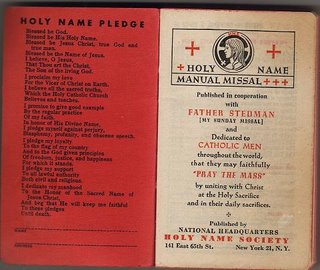
My Grandpa Doherty’s Holy Name Society Missal, 1945.
Grandpa’s advice to us – “Don’t ever vote for a Republican. They’d leave you without a pot to p*** in.”
My father was from a big Irish family in Somerville that always wanted to get out of there. My father was tough but with a sensitive side. He had a way with written and spoken words and had big dreams. In 1945 he tried to join the Marines at the age of 16. By the time the Korean War came around in 1950, he had other ideas. He was much more interested in college at Tufts University, but rather than waiting to get drafted, he enlisted in the Army and went into Officer Training School. My father never missed a Mass that I know of, but he didn’t talk about religion much. He worked as a valued copywriter and creative director for several Boston ad agencies, but the pressure and cut-throat nature of the ad business caused a lot of stress on him and took a toll.
My mother was from the urban melting pot of the West End of Boston. My mother was a devoutly Catholic woman, but on her own terms. She turned out to be a progressive later on in a lot of ways, and I suppose that came from being a nurse and seeing lots of hard cases (abused children, unwed mothers, etc..), but years later she said she always missed the "mystery" of the Tridentine Mass and always stuck to her private devotions she'd learned so long ago from the Sisters of Notre Dame who'd educated her. On the other hand, those Sisters at St. Mary’s High School in Cambridge were never able to break my mother’s defiant spirit with their corporal punishments… “I don’t care why the length of side A doesn’t equal the length of side B (thwack!) I don’t care! (thwack!) I … don’t … care….”
In the late 1950s, devotions are still very important in Catholic life. My mother and my aunt (my mother’s sister-in-law) live according to First Fridays and the Novena of Grace to St. Francis Xavier. All of the boys in my cousin’s family will be given the middle name of Francis. My brother and I will be given the middle name of Xavier, so that no one will confuse us with being named after the great man from Assisi (For my whole life, this has been a litmus test for me as to who is Catholic or at least familiar with Catholic culture. Whenever someone is completely flummoxed by my middle initial of “X”, I know there isn’t much Catholic literacy there).
Novena Of Grace of St. Francis Xavier
We have come together to worship the Lord our God and to honor the memory of His great missionary, St. Francis Xavier. Through his powerful intercession, let us pray for ourselves, for the missionary efforts of the church, and for all the People of God.
For missions and missionaries throughout the world,
that through the proclamation of the Good News of salvation, all people may come to know the one true God and Jesus Christ whom He has sent.
Let us pray to the Lord: Lord, hear our prayer.
For the Church, that renewed by the Holy Spirit, she may show forth to the world the mystery of the Lord and be an instrument of redemption for all.
Let us pray to the Lord: Lord, hear our prayer.
For Christian unity, that the Spirit of Christ, dwelling in all who believe, may bring us to that fullness of unity which Jesus desires -- one Lord, one faith, one baptism.
Let us pray to the Lord: Lord, hear our prayer.
For the unrepentant,
that moved by God's loving mercy revealed in Jesus,
they may repent their sins and open their hearts
to the divine life of grace.
Let us pray to the Lord: Lord, hear our prayer.
For ourselves, that we may be ever faithful to our baptismal commitment to Christ, and bring Christ's word and Christ's love to the world in which we live.
Let us pray to the Lord: Lord, hear our prayer.
Lord God, our Father, we honor the memory of the Apostle of the Indies and Japan, St. Francis Xavier. The remembrance of the favors with which You blessed him during life and of his glory after death fills us with joy; and we unite with him in offering to You our sincere tribute of thanksgiving and of grace.
We ask You to grant us, through his powerful intercession, the inestimable blessings of living and dying in the state of grace. We also ask You to grant us the favors we seek in this novena.
But if what we ask is not for the glory of God and the good of our souls, grant us, we pray, what is more conducive to both. We ask this through Christ our Lord.
Amen.
I remember my mother and my aunt dragging me from church to church, letting me light those candles wherever we went. "Here's a dollar to put in the box. Who would you like to pray for? Hail Mary, full of grace…" Catholic Churches seem cavernous and cool and welcoming on a hot day, filled with votive candles, marble, and fleshy paintings.
I’m getting trained for Church before I even enter one. Over and over, I am shown a triptych, and as I open the doors of it, there is a glow-in-the-dark image of Jesus inside on the central panel. I think it might even been one of those things where the face in the image opens and closes its eyes as you move it. “That’s Jesus…Shhhhhh… Shhhhhh”. The most important thing I am to take away from this is that Jesus is very holy and very sacred and that I must be quiet, very quiet in Church. At Mass, the priest has his back turned, and I can barely hear or understand what is being said. I’m on my knees with my hands resting on my arms on the lacquered pew, or I’m sprawled among everyone’s feet and legs on the kneelers. “I want to go home… When is it going to be over?”
In our town, Monsignor Louis Cunney has been the pastor at the parish since 1951. Stern, serious, cassocked, and unapproacheable. I don’t recall ever speaking to, or being spoken to by him.
The hymn, I remember being sung most often:
To Jesus Christ Our Sovereign King
To Jesus Christ, our Sovereign King,
Who is the world's salvation,
All praise and homage do we bring,
And thanks and adoration.
Refrain:
Christ Jesus Victor, Christ Jesus Ruler!
Christ Jesus, Lord and Redeemer!
Thy reign extend, O King benign,
To every land and nation,
For in Thy kingdom, Lord divine,
Alone we find salvation.
(Refrain)
To Thee and to Thy Church, great King,
We pledge our hearts' oblation,
Until before Thy throne we sing,
In endless jubilation.
(Refrain)
Our catechesis is the Baltimore Catechism. Distinctions between mortal and venial Sins are crucial. Lots of actions are mortal sins, but no sin can be mortal, unless you know it is seriously wrong and you do it anyway, on purpose.

The one that is always mentioned at the top of the list is missing Mass. Intentionally missing Mass is a mortal sin. Even worse, if you do go to Mass, and you receive communion with a mortal sin on your soul, that is a mortal sin as well. If you die with a mortal sin on your soul, just one, you will go to hell. Although it is rarely spoken about anymore, the Church has never changed its teaching on this.
In my missal it says:
The worst thing in the whole world is mortal sin. It kills the divine life in your soul and makes you deserve to suffer in hell. After mortal sin, the next worst thing is venial sin. Some young persons and even old ones care nothing about venial sin. "It is only a venial sin" they say, "and venial sins do not make you deserve to suffer in hell." How stupid ! Persons who do not try to keep out of venial sin find it hard to keep out of mortal sin. And besides, who wants to suffer in Purgatory for being careless about venial sins ? Be smart ! Try to keep out of all sins-mortal and venial.
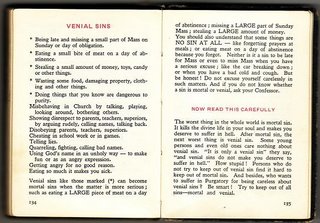
Preparation for our first Confession is lengthy and serious. I think we spent more time on prep for this than we did for our First Communion. Examination of conscience… List the sins by category and number… “Bless me Father for I have sinned. It has been two weeks since my last confession.” One Saturday afternoon I’m in a fury because my brother and sister are laughing at me and teasing me. From the pews they’d heard me saying to the priest in the confessional, “I used the Lord’s Name in vain no times at all.”
My brother is breathlessly telling a story: “Did you hear what happened at CCD today? Some kid in the communion preparation class took a practice host out of his mouth and looked at it. Cunney grabbed him and threw him right through the door out into the hall….”
My First Holy Communion. May 13, 1967
 The sisters had drilled us to get ready for First Communion. This is serious business, and we are told what to wear with no exceptions. The boys are all to dress in a crisp white shirt, black pants, spotless, shined shoes, and a cloth scapular. Through long hours of drill, these women have been able to train us wild little Irishmen into disciplined ranks of well-trained soldiers for Christ.
The sisters had drilled us to get ready for First Communion. This is serious business, and we are told what to wear with no exceptions. The boys are all to dress in a crisp white shirt, black pants, spotless, shined shoes, and a cloth scapular. Through long hours of drill, these women have been able to train us wild little Irishmen into disciplined ranks of well-trained soldiers for Christ. Afterwards, there is a celebration in the Parish Hall. We receive our metal scapulars and have a great breakfast. I recall that someone from the archdiocese had brought in a relic of what was claimed to be a splinter of the True Cross. It was a great day.
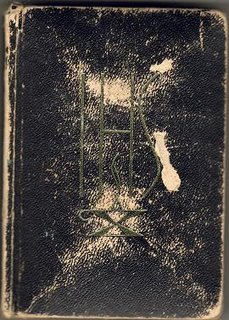
The Missal I was given on my First Communion.
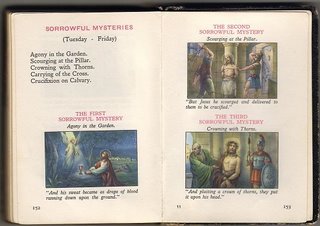
In order to take Holy Communion, you needed to fast from midnight on. For a kid, that essentially means fasting from dinnertime on Saturday night. I tell my own kids now not to complain about the current one-hour rule.
I own one blue suit, and that is what I wear to Mass every Sunday. The suit has a reversible vest. One side matches the suit, and the other side is light with a checked pattern. I alternate how I wear the vest each week. I have a few clip-on ties. Formal dress is the norm at Mass. Every guy wears a suit, or at least a tie and blazer. Women wear dresses and hats. It was a much more formal time. Casual wear or shorts never would have even been considered. I saw an episode of Classic Sports not long ago of a World Series game in the 1960’s. All of the fans were wearing white shirts and ties. In the 1970’s, everything turned around on a dime regarding this.
Holy Communion is received on the tongue over a paten, kneeling at the altar rail. You wouldn’t dream in a million years of ever touching the consecrated host with your hands. Unthinkable. The first time I saw it happen, I was stunned. Although I’m not one of those who considers communion in the hand a sacrilege (and I really appreciate being able to receive the cup), and although I receive and give out communion in the hand as an EOM, I do believe that the old way was better. I think a lot of reverence for the Eucharist has been lost, and even from a logistical point of view, this was preferable. If there is one matter in which I would long for a return to tradition, this would be it.
As much fun as Christmas is for kids, I just love the Lenten season, and I love it even as a child. One of the memories that sticks with me most vividly is how everything was covered with purple cloth during Lent. The statutes, the Stations, the big crucifix over the altar… everything had a specially-fitted purple covering that went over it. A lesson should be learned from that. Symbols are very powerful, and they stick in the minds of children forever. Important to keep in mind when considering the liturgy.
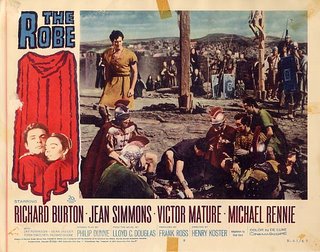
We have the day off from school on Good Friday, but it’s not your typical day off from school. There is no running around, no playing inside or outside, and no board games. It is a day to be kept solemnly, particularly around 3:00 PM, when we are reminded to be silent and prayerful. There is no TV allowed either, at least not until the late afternoon, when they start showing the Bible epics and other religious movies. I love these flicks… Richard Burton and Victor Mature in The Robe, Anthony Quinn in Barabbas, Charlton Heston in Ben Hur, Max Von Sydow in The Greatest Story Ever Told, Jeffrey Hunter in King of Kings. During the year there are a few Catholic-oriented movies that are regularly on TV – The Nun’s Story, Boy’s Town, San Francisco, Going My Way, Angels with Dirty faces, The Sound of Music, and the Miracle of Our Lady of Fatima. The last movie, and in fact, the whole Fatima story, was and still is unnerving and disturbing to me, and contrary to everything else I had ever been taught about Mary. The thing I remember the most about the movie was the provincial administrator threatening to boil the children in oil if they didn’t divulge the Fatima secrets.
On Holy Saturday we spend hours dipping hard-boiled eggs into colored dyes for our easter egg hunt. Great fun. I can still remember the white vinegar smell vividly.
When you took home some palms on Palm Sunday, that was really something…Thick, heavy, scentful palms that seemed like an entire frond for each individual. Compared to what you get now, it was like taking home half a palm tree per family.
On Easter Sunday morning, I’m always hoping against hope that I’ll get a huge solid chocolate rabbit, but it’s always a chocolate-covered coconut egg. I’m not crazy about coconut. It takes me weeks to gnaw my way through it. Sometimes we get those sugar eggs with the windows and the small chick inside.
The nuns who teach us CCD are good teachers and they are always throwing in little extras for us as far as the Mass is concerned. I follow their suggestions to this day… “When the priest lifts up the Body of Christ, pray to yourselves silently, ‘Jesus I love you’. When the priest lifts up the cup, pray to yourselves, ‘My Lord and My God’. When you pray, ‘Lord I am not worthy that you should come under my roof, speak but the word and my soul will be healed’, pray it silently to yourselves three times afterwards.”
One well-meaning but slightly cracked sister tells us that the light emanating from the Body of our Lord is so bright, that if you should look at the light from the tabernacle when the priest opens it, it could blind you. Freddy and I shield our eyes for months afterward at this point in the Mass. It is basically the same thing we’ve heard in the public school regarding a solar eclipse.
I’m not sure what year Father P. arrived, but he got everyone’s attention in a hurry. He could startle you at the beginning of Mass with a booming, nasal “In the NAME of the FATHER, and The Son….”. He was a stout, abrupt man with round glasses. In terms of style, speech, mannerisms, appearance, and probably his theology, he was remisniscent of the “Radio Priest” of the 1930’s Father Charles Coughlin (play the audio clip = You want that. You voted for that. You have that, and it’s time that you take that.”)
One Sunday, Freddy and I are clowning around and talking during CCD. The Sister hauls us out of class and takes us down to see Father P. “Give me you last names”, he barks at us. We tell him, and he rattles our home addresses back at us, rapid fire. We’re absolutely amazed and dumbfounded. He knows everything! “I know your parents. They’re good Catholics… What would your mothers and fathers say if they knew what shenanigans you were up to in CCD class?". We hardly know what to say. “Sorry Father. It won’t happen again, Father…”
One day Father P. asks the girls to leave the CCD class with the nuns for a while. He wants to have a word or two alone with just the boys… He’s going to straighten the lads out a little bit.
“What is God’s name?”
We glance at each other, a little bit confused. The sisters had taught us that you weren’t supposed to say God’s name. A few suggestions come out… “Yahweh?” “Jehovah?” “Jesus?”
Father P.’s answer is: “Hallowed.... Our Father who art in heaven, Hallowed be Thy name….”
Now we’re really confused. We know that hallowed means sacred. Is Father trying to tell us that God’s name is too sacred to say, or does he really think that “Hallowed” is a name? To this day, I’m still trying to figure this one out
“Boys, what swear is a serious, serious sin?”
We all look at each other again. Is Father really asking us to swear here in CCD class, right in front of him?? Giggling nervously, a few of us start by trying out the usual potty words.
“No, that’s not a sin… No, no, not that one either. Scatalogical reference… No, that is scatalogical as well….” He’s waiting, and we all know what he’s waiting for.
Finally, one of the oldest, biggest kids in the class has the temerity to meekly try out the bomb…
“F___?”
“THAT’S it!! THAT’S the ONE!! THAT is the ONE word you must NEVER Say!!!”
One of the nuns is young and pretty and smiles all the time. We just love her. She’s nice all the time, plays the guitar and sings, and she teaches us hymns like Michael, Row the Boat Ashore. No, I don’t think we did Kumbaya. I think we might have been a little too old for that. I think the older nuns worry about her a little bit, particularly several years later when she’s playing the Jesus Christ Superstar album over at the convent. I wonder whatever became of her. I wonder if she stayed.
It’s rare for kids to hear Mass with their parents. On most Sundays, the adults are in the upper Church, and the kids are in the lower Church in the basement. Girls are on one side, and boys are on the other. The sisters and lay volunteers walk up and down the aisles, making sure we’re not talking and that we are paying attention. Every once in a while Father P. stops himself during Mass and tells us to keep quiet.
Mike Fitzpatrick is knuckling the back of my head and shoulders from the pew behind me. “Connors, I’m going to kick you ass”, he hisses. “You’re dead tomorrow at school.”
“OK Fitz. I guess I’ll see you after school, then.”
On Monday, nothing happens, but it was not at all unusual for guys back then to settle things with their fists on the playground after school. No one is the public school administration seemed to know about it or particularly care. No suspensions, no psychologists…. There was the odd chance that a male teacher would come out and break it up and growl at everyone to “knock it off.”
One of my best friends in the neighborhood is Scott. He’s Jewish. His mother is an attractive blonde woman, a convert. His father is a big, burly man with a goatee, militant in his Jewishness, and intensely proud of Israel’s lightning victory in the Six-Day War. I think he’s really cool, because they have a leopard-skin rug in their living room made out of an animal Scott’s father had bagged on a safari in Africa. One day my brother and I came over to their house looking for Scott and his brother. I think it must have been a Jewish holiday, because we were left waiting outside for a long time on the doorstep while Scott’s mother gave them a long (and audible to us) lecture about their Jewish identity and their lack of deportment acknowledging it. Scott and I like to play for hours and hours and to talk about the various TV shows we’d seen the day before. One December day I ask him if he’d seen the new animated feature, The Little Drummer Boy. He replied “I don’t watch that Christian crap.” That stings, but I don’t hold it against him, because I think I’m hearing his father talking.
Several years later, Scott and his family have moved to a different neighborhood in town, but Scott has come by for a visit. We’re wrestling in my front yard, and I have him pinned. He can’t move, and we’re both laughing. “Say your prayers”, I say. Then, inexplicably, I add “Oh, I forgot. You don’t pray.” The laughing stops instantly, and Scott glares at me, his eyes flashing in absolute fury. He springs up to his feet as if I weigh nothing and he is on his way out. Realizing immediately what an offensive and stupid thing I’ve said, I apologize profusely and beg him to forgive me. He’s having none of it. We never saw each other again.
Summer days seem to last forever and the nights are steamy and full of mosquitos until the sprayer trucks come around, billowing huge clouds of insecticide. No one has any A/C yet on our street full of Cape houses. Some of my friends on the street have some cousins from the South up visiting for a week. One hot night we’re running around, ranging through the back yards of the neighborhood with our shirts off. The oldest brother in the Southern family asks me what I have hanging from the chain around my neck. I show him my scapular. “Ah, y’all are Cat-licks. We’re Christians.” I’m puzzled by this. “What do you mean? We’re Christians too.” He then instructs me in all sincerity, without a hint of of malice, “No, no… See, you all are Catholics. We’re Christians.”
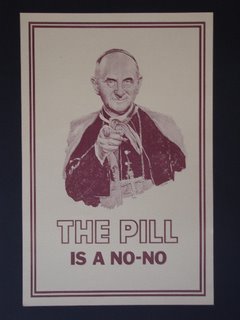
Google Image Search is an amazing thing. I doubted I was going to be able to find an image of this poster, but there it was… My mother had this poster hanging up inside the door of the closet in my parents’ bedroom. One day I asked her what it meant, and she laughed and told me in a non-explicit way. Knowing my mother’s sense of humor, this poster is the kind of thing she would have found funny, although I think she was surprised that Pope Paul came down with his decision on this the way that he did. I think she thought (along with a lot of other people) that he was going to follow the advice of his hand-picked commission and go the other way. My father had a pretty good sense of humor, but I sometimes wonder if he thought the poster was funny.
In 1971 Monsignor Cunney died suddenly. His body lay in state in the Church for a few days, the first deceased person I had ever seen.
The Age of Aquarius isn’t going down too well with Father P. at all. He seems more and more frustrated and agitated as time goes on. He just doesn’t know what the heck is wrong with young people nowadays. As we’re heading towards adolescence he blurts one afternoon, “Girls, don’t ever let the boys touch you. Boys, don’t touch the girls and don’t touch yourselves either!"
I don’t have any recollection of when the Mass started being said in English. I don’t recall any particular sense of outrage. I think most people were happy about it. If there was some resentment about it, I didn’t catch it, but that doesn’t mean there wasn’t any. I learn years later that the parish has deep divisions in it. Factions had apparently formed, and the atmosphere among some groups of adults was tense and bitter.
In 1971, a new Father P. arrives at the Parish. He remained the pastor until 1993. I only regret that it took me so long to realize what a treasure this man was. He was the finest priest I’ve ever known. He left in 1993, but returned to stay in residence from 1996 until he passed away in 2004. In addition to be a man of deep spirituality, pastoral skill, wide interests and intellect, he was a model of a priest who believed in collaborative ministry and consultation with the laity. The parish flourished under his stewardship.
By the time I finished up my CCD years, the Baltimore Catechism had started getting phased out of what was now being called Religious Education. I have to say that although there was a lot that I loved about the Catholicism of my childhood, a lot of it was fear-based rather than grace-based. In this respect, Vatican II was a great blessing, applied and understood in the proper context. The group of kids who came up directly after us, however, were the victims of a pendulum that swung too far in the opposite direction. In order to get away from this fear-based teaching, the teachers overcompensated too far the other way. As for the kids, theirs was the generation of smiley –face catechesis, are-you-running-with-me-buddy-Jesus, God is Love, God Is Love, God is Love, over and over again in word-search puzzles. Their knowledge of the faith was negligible, which is tragic. I am thankful to my parents, both incarnations of Father P., and to the sisters, that at least I had that knowledge base.
In my teens and twenties, through various struggles with the flesh and with the intellect, I think the fact that I always kept going to Mass every week throughout it all is probably the thing that is most responsible for why I kept my faith. It was like that old Dan Fogelberg song Hard To Say - “You’re faithful to her in your careless way, and so you miss her when she's far away, but every time you think you’ve got it straight, you fall.” Maybe that fear of mortal sin associated with missing Mass wasn’t such a bad thing after all. Maybe there was some deep old wisdom in that emphasis. Even when I was living in such a way that my conscience wouldn’t allow me to go up to receive communion (and that went on for years), I still kept going to Mass every week. Thank God for it. Nevertheless, I am a believer in Vatican II and what it did for the Church, reversing the grip of anti-modernist zealots over the Church who had squelched the faith in Europe and would have done the same in the USA eventually. While there was much I loved about that pre-conciliar Church, the post-conciliar Church is better. I wouldn’t want to go back. As it says in the writeup for the history of my parish:
The Second Vatican Council examined both the Church's internal life and her relationship with the world. When the Council ended, the reforms and changes went far beyond what anyone had anticipated and called all of us to a new, shared responsibility in carrying out the mission of the Church. Few aspects of Church life were unaffected. On the level of the parish, these changes were most profoundly experienced in its worship and especially the celebration of the Eucharist. What had been a very passive experience now invited the congregation to be fully involved.
Thursday, July 13, 2006
Lose your temper, risk losing your reputation
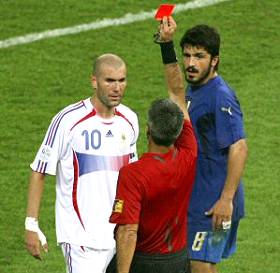 I was born with a disposition towards a quick, hot temper. I’ve had to learn to control it over the years. If I think back over my life, the moments that I most regretted and the biggest mistakes that I have made tended to be associated with events where I let my temper get away from me. I can think of several times in particular in which I thought that my display of “strength” would demonstrate to one young woman or another that I was not a pushover. Wrong move... My oldest son tends to be hot-tempered as well, and I’m working hard to help him learn to deal with that.
I was born with a disposition towards a quick, hot temper. I’ve had to learn to control it over the years. If I think back over my life, the moments that I most regretted and the biggest mistakes that I have made tended to be associated with events where I let my temper get away from me. I can think of several times in particular in which I thought that my display of “strength” would demonstrate to one young woman or another that I was not a pushover. Wrong move... My oldest son tends to be hot-tempered as well, and I’m working hard to help him learn to deal with that.I enjoyed the World Cup event for the most part. I especially enjoyed living vicariously though our new fussball-mad German neighbors next door, celebrating and lamenting with them through the ups and down of the tournament. The games were a lot of fun to watch, although as an American, there are several things that felt “foreign” to me and are hard to understand. Previously, I made some references to those things that I consider as flaws of the sport here.
One of those foreign, inexplicable things, was the event that took place in the final match between France and Italy. I’ve been told that Zinedine Zidane, the brilliant French midfielder, is the greatest soccer player of his generation – probably the best player to come along in the last 20 years. He was born in Marseilles, of Algerian descent. After a long and stellar 18-year career, he recently retired from soccer, but came back out of retirement to help a floundering French team get in shape to recapture some of the glory days they enjoyed in 1998.
Well into the overtime period of last Sunday’s game, tied at 1-to-1, it looked like the teams were headed towards deciding the game by penalty-kicks (which seems to be the way that most important soccer games are decided nowadays…). This was especially worrisome for Italy, because Zidane had already scored on a penalty kick earlier in the game. He’s especially good at them. He handles the pressure with aplomb, like he has ice-water in his veins. Zidane got tangled up with the Italian defender Marco Materazzi at midfield, and the two players had words. This video shows the incident in which Materazzi (the game’s other goal scorer) was manhandling Zidane a bit. According to Zidane, he turned to Materazzi and said something like, “If you want to swap jerseys, we can wait until after the game.” As Zidane extricates himself and pulls away, Materazzi is muttering something at him. After a few more steps, Zidane turns around, walks back, and knocks Materazzi right off of his pins with a powerful head butt to the chest. Zidane was given a red card and ejected from the game, leaving the stunned French announcer to lament “Why?… Why?”. France became dispirited and discombobulated after this loss of poise from their leader, and their lack of confidence showed. They lost the World Cup to Italy minutes later on penalty-kicks. Zidane was in the locker room when the game ended, and did not come out to the stand later to collect his silver medal.
According to Zidane, Materazzi insulted his mother and sister several times. Materazzi denies insulting his mother. In this article, Britain's top forensic lip-reader, Jessica Rees, claims that Materazzi called Zidane a "son of a terrorist whore". Another lip-reader claims that Materazzi had told Zidane that his sister was a "prostitute".
Whatever the truth is, a taint is left on both players as a result of each losing his temper. Zidane was awarded the “Golden Ball” as best player in the tournament, but that might not hold up. French fans have made up songs and games about the head butt, but over time, I sense that this will be forgotten, and the conclusion will be that Zidane lost his cool and his poise when his team most needed him, and Italy won the Cup as a result. After a long and brilliant career, this will be remembered as the signature event of it, and it happened after his official retirement in a World Cup final.
In the NFL and in other American professional leagues, players try to get each other’s goat all the time, even to the point of saying nasty things about each other’s mamas, but I’ve rarely seen such a meltdown in such a clutch situation. American athletes are taught to shrug this stuff off as best as they can and to prove whatever they have to prove with their play. Then again, maybe I’ve got it all wrong in looking at it through American eyes. Will Europeans see it differently, particularly the French?
A reggae-like song about the head butt has become an instant Internet hit. Sportswriters and the French sports minister called his action odious, shameful, unsportsmanlike, and petulant. Yet rumors abounded that something unsupportable had been said. Lip-readers were employed by various news organizations and concluded that the Italian had used racial epithets or slurs against Zidane's mother and sister. The right-wing Italian Senate president fueled speculation by saying the French team "sacrificed its identity by selecting blacks, Islamists, and communists."
Finally, on Wednesday night, Zidane appeared on national television.
Yes, the soccer star said, Materazzi had used terrible language, insulting his mother and his sister. No, Zidane said, he would not repeat the exact words. All he would say was that he was profoundly, deeply hurt.
"I would rather have taken a punch in the face" than hear such insults, he said.
Zidane, dressed in a T-shirt with a khaki Army surplus coat draped over his shoulders, said repeatedly that he apologized to the children and teachers of the world who saw his head butt.
He called his act "unforgivable" but called for sanctions as well against "the true culprit" who had insulted his family.
Then, mixing his message even further, he declared that he regretted nothing. To have refrained from reacting would have implied that the Italian was right to utter the insults, he said.
"I take responsibility for the good and the bad," he said. "Now another life begins. I'll be less watched, less observed. I am going to try to devote myself to my children and my family. I intend to return to Algeria to rediscover my roots, the land of my parents."
With those words, he reminded his audience of how far he had come. For Mr. Zidane has long been the prime example of a "beur," as French people of North African descent are commonly called, who crossed over into mainstream celebrity status by way of professional sports. He was a source of pride in immigrant neighborhoods, a case in point for French politicians who insisted on the openness of French society and a bane to those on the xenophobic far-right who complained France was losing its white European identity.
In the final score, Zidane became for some the embodiment of a quality admired in more than a few French circles: the willingness to sacrifice victory for pride.
"I see, thanks to Zidane, the victory of a certain national spirit," wrote François Sureau, a French philosopher, in the newspaper Le Figaro, on Thursday. Zidane, he said, "has given us back our beautiful reputation for insolence."
Sunday, July 09, 2006
Christian Pacifism: Wimpiness, or Prophetic Witness?
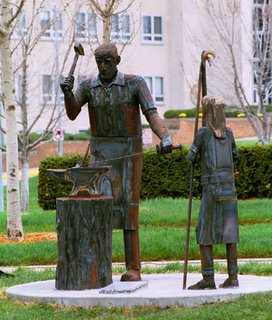
One thing I’ve sometimes noticed in discussions about Christian Pacifism, is that it is often misunderstood. In the popular imagination I believe it is considered hopelessly idealistic and unrealistic, or worse, the cowardly haven of milquetoast, panty-waisted, self-hating Americans who want to bury their heads in the sand and pretend that evil forces in the world do not exist. But is this accurate?
I sense that Jesus Christ demands a lot more of us than what is covered in typical pious platitudes and pie-in-the-sky bromides we hear in a lot of Churches. There is far too much equivocation going on with the Gospel. Liberal Churches tend to stress the Peace Tradition as a form of prophetic witness. A lot of conservative Christians today are quick to look down on certain aspects of liberal Christianity, especially those who’ve traveled a hard road of alcoholism, or drug use, or promiscuity, and were pulled out of a downward spiral by the strong hand of God in a saving act of faith. For a lot of people who’ve gone back to the various churches, Christianity is a means to impart good values to their children – to keep them on the straight and narrow and to keep them from messing up their lives with indiscipline, substance abuse, and premarital sex. All of that is well and good, but that is a positive by-product of Christianity. It is not the essence of what it is.
Jesus spoke often of the Kingdom of God and our role in helping to bring it about. Jesus was speaking about a profound change to come about in the world. "The coming of the kingdom of God cannot be observed, and no one will announce, 'Look, here it is,' or, 'There it is.' For behold, the kingdom of God is among you." The Kingdom is “here, but not yet”. There is an apocalyptic aspect to it, but it is also an undercurrent that runs through history. As members of the Body of Christ, “being in Christ”, and being granted sonship, we have a cooperative role to play, but the greater role is His. A great part of holiness is to step out of the way with our own wills and to let God do his work through us. If Christians don’t work to transform the world, and if the world is never transformed, then for what was this reconciliation between God and Man? “Thy will be done on Earth as it is in Heaven…”
Stephen Hand is a traditionalist who shares with many liberal Christians a belief in Christian Pacifism. On his TCRNEWS website, he posted this article by Michael Baxter, CSC, on Just War and Pacifism: A "Pacifist" Perspective in Seven Points, in which Baxter offers his views on what Christian Pacifism is, and what it is not. Some excerpts:
Having been asked to speak from a pacifist perspective, I should state right away that I have misgivings about the word "pacifism." Not only does it have connotations of an unreasonable refusal to take up arms to defend the innocent, like your wife or daughter or grandmother who is being raped. It also implies a moral position the substance of which is intelligible without reference to Christian belief and practice. This is not the kind of "pacifism" (if one must use the word) that I espouse. Placing the qualifier "Christian" before the word "pacifism" helps to correct this problem to some extent. But the implication still remains that pacifism is a coherent position the core of which is the same in spite of its many varieties.
At the outset of Romans 5, we read, "So then, now that we have been justified by faith, we are at peace with God through our Lord Jesus Christ" (Romans 5:1). In this context, "justified by faith" means "being admitted into God's favor in which we are living" (v. 2). This favor was puzzling because we were "still helpless," "godless" (v. 6), "still sinners" (v. 8); because we were "enemies" (v. 10), as the text reads "for if, while we were enemies, we were reconciled to God through the death of his son, how much more can we be sure that, being now reconciled, we shall be saved by his life?" (v. 10). For Paul, a fundamental and far reaching reconciliation has been accomplished in and through Christ, the reconciliation of God and humanity. We, who were God's enemies, have been brought into God's peace. This is not a reconciliation of individual Christians with God, as understood in certain strands of the Lutheran and Evangelical traditions. Rather, it is a reconciliation that is inherently social. It dissolves the enmity between Jew and Gentile. In this sense, the cross of Christ forges a new people, who live in a new way, made possible by Christ. Peace is thus, first and foremost, en ecclesial reality, and inasmuch as the Church is, in traditional Catholic ecclesiology, a perfect society, it is also a social reality…
…The irreducibly social character of peace, in the Catholic theological tradition, is illustrated in the great anti-Arian treatise On the Incarnation, where Athanasius declares that the truth of the divinity of Christ has been demonstrated in Egypt inasmuch as the spread Christianity has brought that land peace, true peace, God's peace. If we were to inquire as to how this peace is established, the answer would have to be that it is through the lives of those claimed by Christ in baptism, confirmation, and Eucharist; lives that are so transformed that Christians may be described as "partakers of Christ" or, simply, as "Christs."
…Similarly, there is the witness of those in the monastic and religious life whose obligations to follow the evangelical counsels included a refusal to participate in any kind of killing. Mot notable among these, perhaps, are the follower of Francis of Assisi, who, like their founder, renounced violence as part of pursuing the imitation of Christ. There are many other elements in Catholic tradition that reflect the Church's abhorrence for bloodshed (in keeping with the longstanding principle "the Church abhors bloodshed") or, to put it in positive terms, the Church's presumption for peace.
…No one receives the gift of peace as an individual, any more than they receive the Body of Christ as an individual. Rather, we receive the gift of peace as members of a body (I Cor 12:12-30, Romans 12:4-5), as branches on a vine who remain in God's love and lay down their lives for their friends (John 15:1-17). In this sense, Francis of Assisi was not "an individual"; he was a saint, a member within a communion, who took into his body the marks of Christ, and was thus shown to be a sharer in the body of Christ.
…There is a continuity between just war and pacifism, in that when the just war tradition is faithfully theorized and practiced, it calls for a politically disruptive witness on the part of its practitioners. The fact that such faithful practice is rare and exceptional should not obscure the demands of this tradition, but should make us press it upon the church all the more urgently, precisely because, as the experience in Austria showed, it has had little impact on the moral discernment of Catholics. One would hope that there would be a long record of careful moral discernment on the part of Catholics regarding their participation in war, in particular, regarding whether or not participating in a particular war would be unjust and thus an instance of cooperating with evil; and whether or not participating in particular actions or operations within a war would be unjust, and thus an instance of cooperating with evil. But the fact of the matter is that there is very little record of this kind of discernment among Austrian Catholics or German Catholics during these years. Moreover, there is very little record of this kind of discernment among American Catholics either.
…Most critics of pacifism contend that it is either unrealistic or irresponsible or both. But if one takes this strict understanding of just war theory, then it too can be criticized on similar grounds. Take, for example, the argument advanced by Finnis, Boyle, and Grisez in Nuclear Deterrence, Morality, and Realism (which by the way has a long section in the footnotes that confirms Anscombe's view of the immoral intentions of Allied Commanders in planning how to wage war against Nazi Germany ). …They argue that deterrence strategy is immoral in that it entails a willingness to take innocent life, or if not, then it entails lying. But, the question arises, if we reject deterrence strategy, what are we supposed to do? Let the Soviet Union conquer the West? In the final chapter of the book, they provide an answer to such questions by offering some "concluding Christian thoughts" including a "profession of faith" in Jesus Christ whose life, death, and resurrection shows to humanity the path of righteousness and true freedom. This path requires Christians to pay many costs, and one of those costs in the context of the nuclear rivalry of the early 1980s is a sacrifice of the notion that the fate of Christianity depends on the future of the Christian West, which must not, they point out, be confused with the kingdom of God. Christians must, in other words, have faith in Divine Providence, which calls them to greater detachment from the Christian West. A similar emphasis on Divine Providence can be found in the encyclical Veritatis Splendor by Pope John Paul II, who argues that one should avoid evil no matter what the consequences, trusting that any and all consequences will be enveloped into God's mysterious plan. This profound belief in Divine Providence is deeply rooted in Catholic tradition which holds that God is capable of bringing forth good from any kind of horrifying evil.
…I have already alluded to the way that this legacy paved the way for a utilitarian method of doing social ethics, a method devised by professional ethicists in order to mitigate the violent dynamics of modern nation-states. But another feature in this development is that things associated with religion are relegated to, and cordoned off within, a different sphere of life. It is a sphere of ultimate ends, rather than means, a sphere of the Absolute rather than the Relative. In this thinking, the last thing we want involved in politics is someone who believes in an absolute ethics, such as set forth in the Sermon on the Mount. Also in this thinking, pacifism gets seen as an Absolute, which means it is irrelevant for politics. Thus pacifists, according to Richard John Neuhaus, in his emotional editorial in the December 2001 issue of First Things, are nothing more than a reminder of the Kingdom to come and have nothing to say about the morality of war among the kingdoms of this world. Hence my misgivings about being identified as a "pacifist." Hence too my wariness of questions such as, "Are you an absolute pacifist?"
So let me answer that question before the question period begins. I am not an "absolute pacifist." Rather, I am an absolute Nicean and Chalcedonian Christian, that is, I believe absolutely that the Son is one in being with the Father, and that the fullness of God's will and the fullness of God's life, is revealed and made possible in Jesus Christ, through the power of the Holy Spirit, which He gave to us, along with His gift of peace. And it is only by thinking more critically about, and distancing ourselves from, the waging of war by modern nation-states, that we will worthily receive that Gift of Peace.
TCR Editor Stephen Hand / On a Personal Note: I have always been a hairs breadth away from calling myself a pacifist, but it seems to me a term easily misunderstood ---and it means different things to different people. If it means opposing wars as a means to resolving international conflicts and having a radical suspicion of what hubris, greed and real motives or misguided analysis lie behind such wars, then yes, count me in from my youth. If it means considering Dorothy Day was a prophet, I have believed that since a very young man, despite a few differences. In other words I am with the radical peacemakers, and forsake all jingoistic warmongers as I would reject Hell itself.
If it means I believe War is largely "a racket" then count me in. If it means judging innocent others for defending themselves when aggressed upon (e.g., Poland after Hitler pounced), count me out. There is a higher way--- the earliest Christians, Gandhi, Tolstoy, and I praise and urge that--- but not all are capable of it when under attack. If it means watching a neighbor get jumped without trying to help, that is ridicuous and unchristian, for it is cowardice not to aid others who are victims of crimes. I can only pray that if I were (alone) personally attacked, I would have the faith and spiritual courage not to defend myself, but to call the aggressor to consider God and the eternal soul he is risking and offer my beating or life for him. But to announce in advance that I would be so heroically virtuous seems ludicrous to me (how can I know?; it would be like saying "I am a Saint" which is preposterous. I have not been so tested.) So we must, it seems to me, be radical peacemakers vis a vis nations and war in general, without announcing thoughtless pronouncements on our virtues ahead of time.
These few caveats are, again, a far cry from modern wars which kill 93% civilians to 7% soldiers. And premptive / preventive wars are out of the question. As is the extension of empire (read "vital interests") through war. And the choice of destroying nations to kill certain dictators while propping up others. We are peacemakers by grace. Not warmongers. We will not fight and kill simply because some government tells us to.
Subscribe to:
Comments (Atom)
